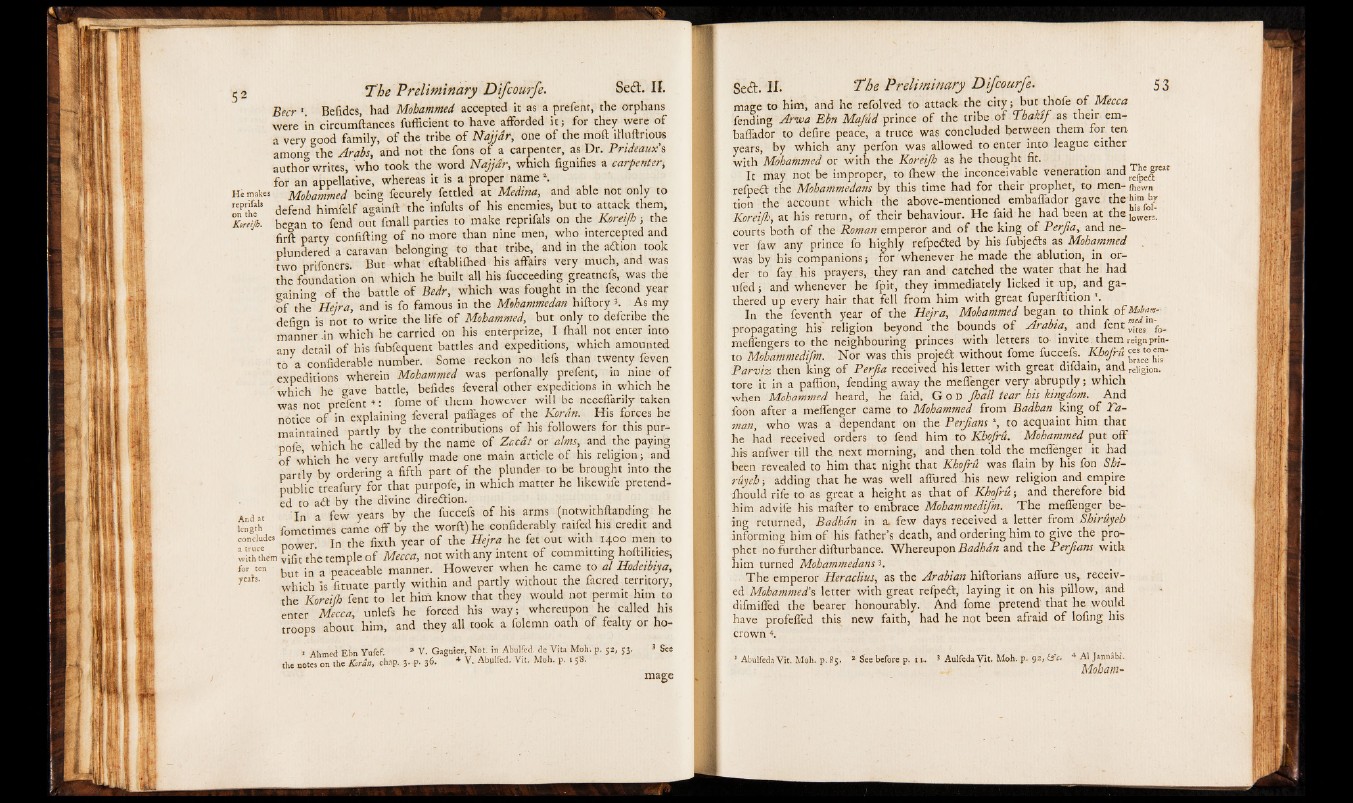
Beer '. Befides, had Mohammed accepted it as a prefent, the orphans
were in circumftances fufficient to have afforded it; for they were of
a very good family, of the tribe of Najjdr, one of the moft iltuflrious
among the Arabs, and not the fons of a carpenter, as Dr. Pndeaux s
author writes, who took the word Najjdr, which fignifies a carpenter^
for an appellative, whereas it is a proper name *•
He males Mohammed being fecurely fettled at Medina, and able not only to
repl f»’5 defend himfelf againft the infults of his enemies, but to attack them,
°KorciJb. began to fend out fmall parties to make reprifals on the Koreijh; the
firft party confifting of no more than nine men, who intercepted and
plundered a caravan belonging to that tribe, and in the action took
two prifoners. But what eftablifhed his affairs very much, and was
the foundation on which he built all his fucceeding greatnefs, was the
gaining of the battle of Bedr, which was fought in the fecond year
o f the Hejra, and is fo famous in the Mohammedan hiftory s. As my
defign is not to write the life of Mohammed, but only to defcribe the
manner in which he carried on his enterprize, I fhall not enter into
any detail of his fubfequent battles and expeditions, which amounted
to a confiderable number. Some reckon no lefs than twenty feven
expeditions wherein Mohammed was perfonally prefent, in nine of
which he gave battle, befides feveral other expeditions in which he
was not prefent 4: fome of them however will be neceffarily taken
notice of in explaining feveral paffages of the Kordn. His forces he
maintained partly by the contributions of his followers for this pur-
pofe, which he called by the name of Zccdt or alms, and the paying
of which he very artfully made one main article of his religion; and
partly by ordering a fifth part of the plunder to be brought into the
public treafury for that purpofe, in which matter he likewife pretended
to aft by the divine direction. |M lLJAnd
at In a few years by the fuccefs of his arms (notwnhftanding he
length fometimes came off by the worft)he confiderably raifed his credit and
concludes ^ j tf the flxth year of the Hejra he fet out with 1400 men to
wkhthem vific the temple o f Mecca, not with any intent of committing hoftilities,
for ten but in a peaceable manner. However when he came to al Hodeibiya,
»*■ which is fituate partly within and partly without the facred territory,
the Koreijh fent to let him know that they would not permit him to
enter Mecca, unlefs he forced his way; whereupon he called his
troops about him, and they all took a folemn oath of fealty or ho-
1 Ahmed Ebn Yufef. 2 V. Gagnier, Not. in Abulfed. de Vita Moh. p. 52, 53. 3 See
the notes on the Koran, chap,*. p. 36. 4 V. Abulfed. Vit. Moh. p. . 53 .
mage
mage to him, and he refolved to attack the city; but thofe of Mecca
fending Arwa Ebn Mafud prince of the tribe of Thaktf as their em-
baflador to defire peace, a truce was concluded between them for ten
years, by which any perfon was allowed to enter into league either
with Mohammed or with the Koreijh as he thought fit. 1
It may not be improper, to (hew the inconceivable veneration and refp'J reat
relpedf the Mohammedans by this time had for their prophet, to men- ihewn
tion the account which the above-mentioned embaffador gave the him by
Koreijh, at his return, of their behaviour. He faid he had been at the Io'^ers,
courts both of the Roman emperor and of the king of Perjia, and never
faw any prince fo highly refpefted by his fubjefts as Mohammed
was by his companions; for whenever he made the ablution, in order
to fay his prayers, they ran and catched the water that he had
ufed; and whenever he fpit, they immediately licked it up, and gathered
up every hair that fell from him with great fuperftition .
In the feventh year of the Hejra, Mohammed began to think ofM.W-
propagating his religion beyond the bounds o f Arabia, and fent fo_
meffengers to the neighbouring princes with letters to invite them reign prin-
to Mohammedifm. Nor was this project without fome fuccefs. Khofru f l g j g i
Parviz then king of Perjia received his letter with great difdain, and rciig;on.
tore it in a paffion, fending away the meffenger very abruptly; which
when Mohammed heard, he faid, G od Jhall tear his kingdom. And
foon after a meffenger came to Mohammed from Badhan king of Taman,
who was a dependant on the PerJians 2, to acquaint him that
he had received orders to fend him to Khofru. Mohammed put off
hrs anfwer till the. next morning, and then told the meffenger it had
been revealed to him that night that Khofru was flain by his fon Shi-
ruyeh; adding that he was well affured his new religion and empire
fhould rife to as great a height as that of Khofru; and therefore bid
him advife his mailer to embrace Mohammedifm. The meffenger ^being
returned, Badhan in a. few days received a letter from Shiruyeh
informing him of his father’s death, and ordering him to give the prophet
no further difturbance. Whereupon Badhd?i and the Perfans with
him turned Mohammedans 1. , ' •
The emperor Heraclius, as the Arabian hillorians affure us, received
Mohammed’s letter with great refpeil, laying it on his pillow, and
difmiffed the bearer honourably. And fome pretend that he would
have profeffed this new faith, had he not been afraid o f lofing his
crown 4.
1 Abulfeda Vit. Moh. p. 85.. 2 See before p. 11- 3 Aulfeda Vit. Moh. p. 92, &c. 4 Al Jannabi.
Moham